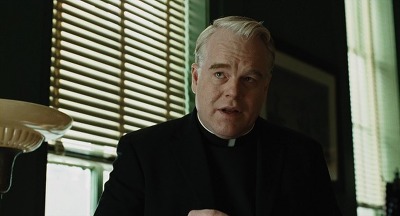← Back to Reviews
in
Doubt (John Patrick Shanley, 2008)

Doubt is set in 1964, but you can easily tell that it deals with the Catholic Church's still-current bane of how priests can possibly be guilty of child molestation, even though now we can see it in retrospect as a horrible crime-within-a-crime which hardly anyone back then would notice, except perhaps for Sister Aloysius (Meryl Streep), an old-fashioned Principal-Nun who may very well have, rightly or wrongly, dealt with many abusing priests down through the years. This time, she has to deal with Father Flynn (Philip Seymour Hoffman), who "seems" to be paying too much attention to a certain young student, but is his attention "immorally-criminal" or is it just somehow questionable in front of a nun who sees everything in the worst possible light? The film presents things even-handedly, and even if you are 100% sure that things are a certain way, you could very well be wrong because the script and direction are so sharp. This is an ensemble film, so all the supporting performances are just as important as the leads, and besides that, this film leads all films this year with FOUR acting nominations.


Amy Adams plays a complex part where she sees almost everything from both perspectives. She can be turned by both lead characters depending on what she learns and feels, but in general, she looks on the bright side of people. Viola Davis plays the mom of the possibly-abused boy in question, and she looks at things from the perspective of just letting her boy survive this school year to qualify for a better, non-Catholic school the next year. Maybe she thinks he's getting too much "love and attention" from the priest but she feels it's OK as a form of recompense because the boy's father is already beating him because he has a feeling that his son may very well be gay. Doubt is not all black-and-white in its depiction of what happens at this church and school. In fact, when Meryl Streep's character breaks down at the end, it really makes you think that she knows nothing at all and has been laying her own "guilt trip" on potentially-innocent priests all along. Then again, maybe not...

Doubt is set in 1964, but you can easily tell that it deals with the Catholic Church's still-current bane of how priests can possibly be guilty of child molestation, even though now we can see it in retrospect as a horrible crime-within-a-crime which hardly anyone back then would notice, except perhaps for Sister Aloysius (Meryl Streep), an old-fashioned Principal-Nun who may very well have, rightly or wrongly, dealt with many abusing priests down through the years. This time, she has to deal with Father Flynn (Philip Seymour Hoffman), who "seems" to be paying too much attention to a certain young student, but is his attention "immorally-criminal" or is it just somehow questionable in front of a nun who sees everything in the worst possible light? The film presents things even-handedly, and even if you are 100% sure that things are a certain way, you could very well be wrong because the script and direction are so sharp. This is an ensemble film, so all the supporting performances are just as important as the leads, and besides that, this film leads all films this year with FOUR acting nominations.

Amy Adams plays a complex part where she sees almost everything from both perspectives. She can be turned by both lead characters depending on what she learns and feels, but in general, she looks on the bright side of people. Viola Davis plays the mom of the possibly-abused boy in question, and she looks at things from the perspective of just letting her boy survive this school year to qualify for a better, non-Catholic school the next year. Maybe she thinks he's getting too much "love and attention" from the priest but she feels it's OK as a form of recompense because the boy's father is already beating him because he has a feeling that his son may very well be gay. Doubt is not all black-and-white in its depiction of what happens at this church and school. In fact, when Meryl Streep's character breaks down at the end, it really makes you think that she knows nothing at all and has been laying her own "guilt trip" on potentially-innocent priests all along. Then again, maybe not...
